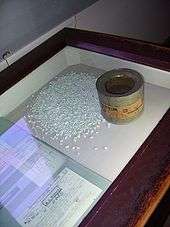Tesch & Stabenow
The corporation Tesch & Stabenow (in short Testa) was a market leader in pest control chemicals between 1924 and 1945 in Germany east of the Elbe. Testa distributed Zyklon B, a pesticide consisting of inert adsorbents saturated with hydrogen cyanide, a volatile liquid extremely toxic to animals and humans. For legitimate use as a pesticide, Zyklon B included a warning odorant as not everyone can smell cyanide or recognize its faint almond-like odor. The company sold Zyklon B to the Wehrmacht and the SS in Auschwitz-Birkenau without the odorant, clearly showing that it was intended for use on humans. Two directors of Testa were convicted and executed for assisting in the mass murder of Jews during the Second World War. The company continued after the war and merged with Heerdt-Lingler GmbH (HeLi) in 1979.
Company history

Tesch & Stabenow was founded in 1924 in Hamburg. In 1925 the firm became the only distributor of Zyklon B on behalf of Degesch east of the Elbe. In 1927 Stabenow left the firm; Dr. Bruno Tesch became 45% owner, Degesch had 55% of the shares; in June 1942 Tesch became the sole owner. Testa distributed a growing amount of the gas to the German army. In 1941 Tesch instructed the SS in Sachsenhausen in the use of the pest control gas. Starting in 1941 Testa sold Zyklon B to Auschwitz-Birkenau, Majdanek, Sachsenhausen, Ravensbrück, Stutthof, Neuengamme, Groß-Rosen and Dachau. The highest turnover of cyanide was in 1943.
Prosecution
On 3 September 1945 the British arrested Bruno Tesch, director Karl Weinbacher and employee Joachim Drosihn. They were brought before a military tribunal [1] and charged with distributing the gas to concentration camps with the intent to kill humans. An employee even stated that Bruno Tesch himself suggested the idea to the SS.
Tesch and Weinbacher were convicted in the Curiohaus trial, and executed on 16 May 1946. Drosihn was acquitted.
References
- ↑ "The Zyklon B Case: Trial of Bruno Tesch and Two Others. United Nations War Crimes Commission, 1947". www.phdn.org. Retrieved 2016-10-16.